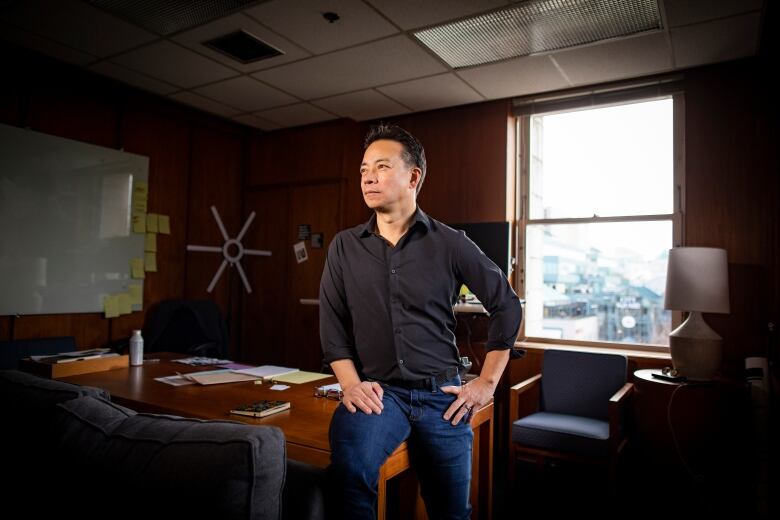 Why can one Metro Vancouver municipality keep property taxes much lower than the others? | | |  | | | It was one in a long line of moments where Port Coquitlam Mayor Brad West seemed to indirectly poke a thumb in the eye of the City of Vancouver.
“Our council knows how challenging it is for many people with rising costs — that’s why we went through our 2023 budget line by line. I’m proud to share that the result is one of the lowest property tax rates in the region — 3.38 per cent,” he tweeted.
It happened 30 minutes after Vancouver Mayor Ken Sim held a news conference to say his own city’s budget would see a 10.7 per cent property tax increase, adding that he understood that such increases “suck” for many people.
On social media, it led to repetition of a common narrative — that Port Coquitlam is a well-managed city focusing on basic municipal services, while Vancouver is a bloated government with too many staff and too many priorities.
When Metro Matters spoke to West about his budget, he talked about their focus on keeping taxes low but freely admitted there’s a little more nuance to why they've been successful while bigger nearby cities have had higher increases.
To start with, all municipalities face the pressures that come with the provincial and federal governments downloading further responsibilities onto them and trying to deal with evolving social pressures.
Port Coquitlam faces them, but as West said, “it’s not to the same extent, of course, as they face in a larger city like Vancouver or Surrey.”
But a bigger reason might be how Port Coquitlam treats its financial reserves. While many municipalities in Metro Vancouver have a longstanding culture of putting their surpluses into various emergency funds, Port Coquitlam — even before West was mayor — has tended to funnel more of those surpluses back into lower yearly taxes.
The tradeoff is that as of 2022, Port Coquitlam has the smallest reserves of any Lower Mainland municipality, with at least 5,000 people, at just $29 million in net financial assets.
A tradeoff West is comfortable with.
“I get it. In 50 years, we might have to replace a piece of infrastructure that's going to be very expensive, and it is responsible to put money away for that,” he said.
“But at the same time, you have to balance that with the current taxpayer's ability to pay.”
It’s fun and easy online to pretend municipalities are fantasy teams where mayors can be traded from one city to another. But in the patchwork that is Metro Vancouver, they all have different populations, different longstanding cultures, different challenges — and will make different decisions as a result.
After all, last week, West retweeted his support for his city’s certification as a Living Wage employer.
And this week, Vancouver announced they were ending their agreement. | | |  | | | 1. Vancouver | | | Speaking of that budget! It’s big! With much of the increase going to policing and firefighters, but also inflation, infrastructure maintenance, and a whole host of smaller items introduced on the day it was passed. Between some anger on the right for the high increase, and some anger from the left for Vancouver opting out of the Living Wage Employer policies, it’s fair to say the ABC honeymoon is, if not over, slightly less rosy than before.
Read more | | |  | | | 2. Surrey | The never-ending drama over the future of policing in B.C.’s second largest city continued, as the Surrey Police Union cried foul over a Surrey councillor voting in favour of trying to keep the RCMP detachment instead — without revealing his child works for them. Whether or not it rises to the level of a conflict of interest is debatable, but surely a provincial decision has to come soon, right?
Read more | | | |  | | | 3. Kamloops | | | | | | |  | | | 4. Salmon Arm | It has less than 20,000 people, but the biggest community in the Shuswap isn’t immune from the tensions seen in bigger municipalities. Council voted unanimously for staff to remove a tent encampment last week after complaints of thefts and drug use in the lobby of a nearby apartment building. We’ll see if this results in the same legal battles other towns have had.
Read more in the Salmon Arm Observer | | | | | | Share this newsletter | | or subscribe if this was
forwarded to you. | | | | That's it for this this week! In the meantime, check out the latest headlines at cbc.ca/bc and follow our municipal affairs reporter Justin McElroy on Twitter. And if you have any questions you might want answered in a future mailbag, drop Justin a line at metromatters@cbc.ca. | | | |

